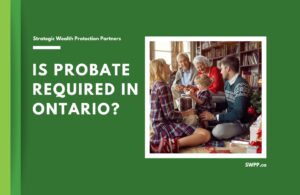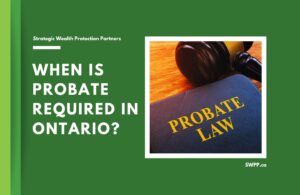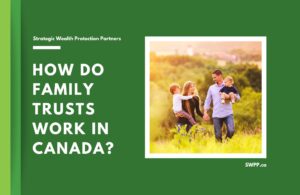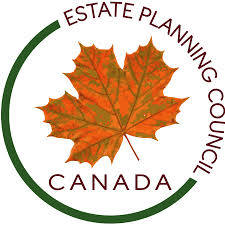Written by Ron Cooke, President & Founder of Strategic Wealth Protection Partners in Ontario, CEA®, Member of the Estate Planning Council Canada
How to Avoid Estate Tax in Canada
If you’re wondering how to avoid estate tax in Canada, this post is for you.
While Canada does not have a direct estate tax, taxes on assets and income after death can significantly reduce the value of an estate.
With the right strategies, you can minimize taxes and ensure more of your wealth is passed on to your loved ones. Keep reading to discover ways that you can minimize the tax and ensure your loved ones are not left with a complex estate.
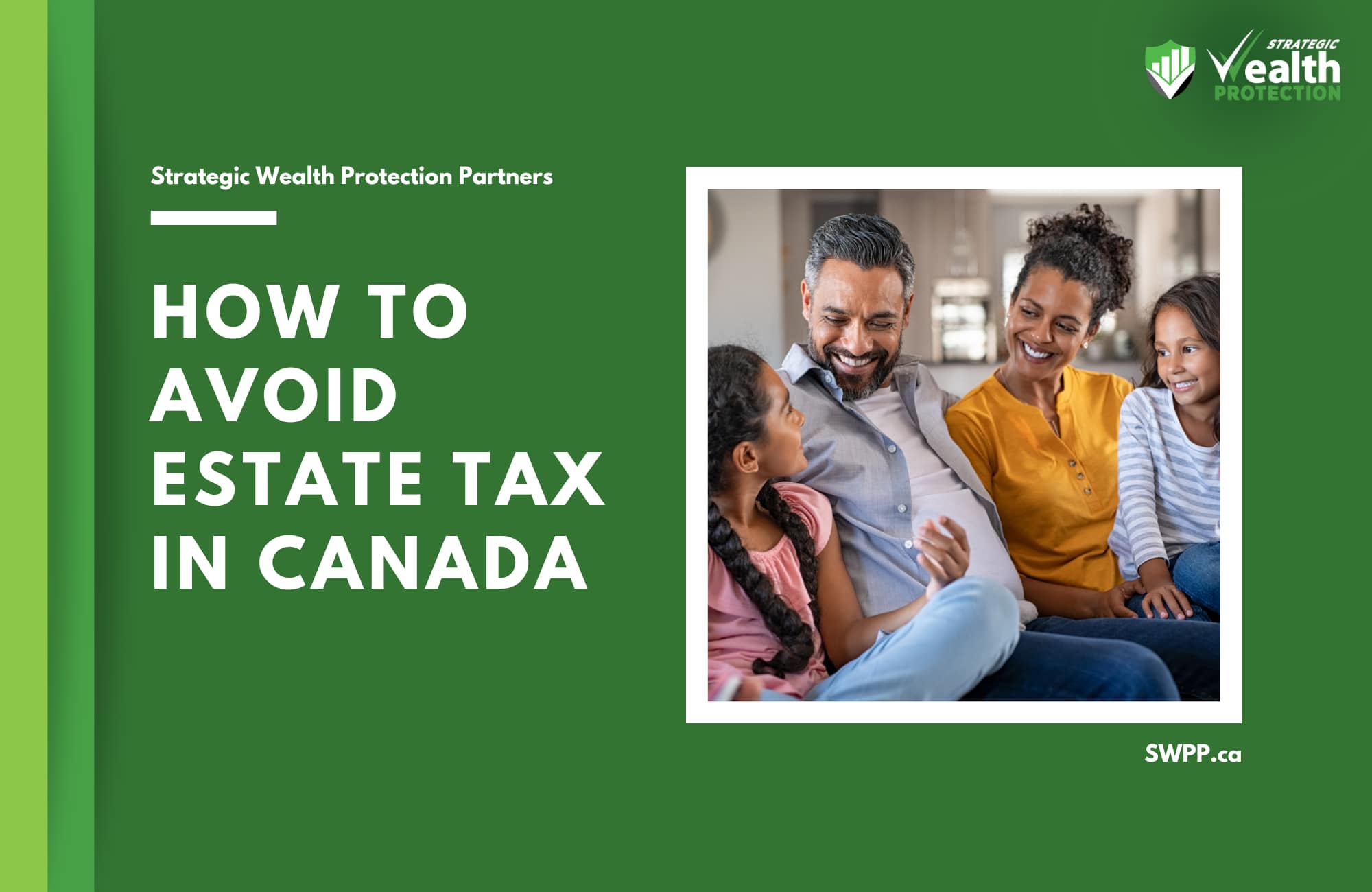
How does estate tax work in Canada?
Unlike the U.S., Canada does not impose a separate estate or inheritance tax.
Instead, when someone passes away, their estate must settle outstanding tax obligations before distributing assets to beneficiaries. This includes capital gains tax on investments and real estate, income tax on registered accounts like RRSPs/RRIFs, and probate fees in certain provinces.
Strategic estate planning can reduce these taxes and ensure a smoother wealth transfer.
Read More: How Much Is an Estate Taxed in Canada?
Summary of Key Strategies to Reduce Estate Tax in Canada
| Strategy | How It Helps | Best For |
| Principal Residence Exemption | Avoids capital gains tax on the sale or transfer of your main home. | Homeowners passing on their primary residence. |
| Spousal RRSP/RRIF Rollovers | Defers tax by transferring registered funds to a spouse or dependent child. | Married individuals or those with dependents. |
| Gifting Assets Before Death | Reduces the size of your taxable estate and potential capital gains. | Those with appreciating assets. |
| Joint Ownership with Right of Survivorship | Bypasses probate by transferring assets directly to the joint owner. | Couples or close family members. |
| Life Insurance | Provides tax-free cash to cover estate taxes and avoids probate. Pay taxes for pennies on the dollar. | Anyone with taxable assets, RRSPs or second relationships. |
| Inter Vivos Trust (Living Trust) | Holds assets outside the estate, avoiding probate and reducing tax exposure. | Individuals wanting control during life. |
| Alter Ego or Joint Partner Trust | Allows tax deferral and probate avoidance for those 65+, while maintaining asset control. | Seniors and retirees. |
| Multiple Wills (Ontario-specific) | Excludes private company shares or certain assets from probate, reducing Estate Administration Tax. | Business owners and professionals. |
| Charitable Giving | Generates tax credits and reduces taxes owed on the final return. | Philanthropic individuals or families. |
| Post-Mortem Tax Planning | Allows executor to use loss carrybacks or pipeline planning to reduce taxes after death. | Estates with private company shares. |
| Bare Trust or Nominee Ownership | Avoids probate and keeps ownership confidential for certain assets. | Real estate or investment owners. |

What is included as income on your final tax return?
The CRA requires a final tax return for the deceased, which includes:
- All income earned up to the date of death (salary, pensions, business income, etc.).
- Deemed disposition of assets, meaning non-registered investments and secondary real estate are taxed on their increase in value.
- The full value of RRSPs or RRIFs, which are treated as income unless transferred to a spouse or dependent child. (This can result in a large tax hit.)
By planning ahead, you can minimize taxes and protect your estate’s value.
Can life insurance be used to pay the taxes on your final tax return?
Yes, life insurance is one of the best tools to cover estate taxes.
Proceeds from a life insurance policy are tax-free and paid directly to the named beneficiary, avoiding probate and CRA claims. Many Canadians use life insurance to ensure there are enough funds to cover taxes owed on RRSPs, real estate, and business assets, preventing the forced sale of valuable estate holdings.
How can you minimize or avoid tax on an inheritance in Canada?
You can reduce inheritance taxes by:
- Using the principal residence exemption to avoid capital gains tax on a home.
- Transferring RRSPs and RRIFs to a spouse or dependent child to defer income tax.
- Setting up a trust to hold assets outside the taxable estate.
- Gifting assets before death to reduce the value of the estate.
- Owning assets jointly with rights of survivorship to bypass probate.
A financial planner can help structure an estate to minimize tax burdens.
Client Case Study: How Mohamed Avoided a $12 Million Tax Burden with Strategic Estate Planning

The Problem
Mohamed*, a 75-year-old real estate investor based in Ontario, owns two real estate holding companies along with various personal assets. Upon his passing, his estate was projected to face a staggering $12 million tax liability.
Since corporate funds cannot directly pay personal tax liabilities, his estate would need to withdraw the funds personally to pay his final income tax return. If the funds were withdrawn from the corporation, additional taxes would need to be paid.
In effect, the estate would need to liquidate $24 million in assets to cover the $12 million tax liability. This is because withdrawing funds from a corporation in Canada triggers personal income tax.
For every dollar withdrawn, approximately 50% could be lost to tax. This scenario created the risk of drastically reducing the value of his estate and leaving his three children with little inheritance.
The Solution
To avoid the forced sale of assets and high taxes, we implemented a life insurance strategy tailored to Mohamed’s needs.
Mohamed purchased $12 million in life insurance, with annual premiums of $1.5 million.
Each year, Mohamed pays the $1.5 million premium into the life insurance policy the policy would grow in both cash and death benefit. Then Mohamed is able to use the life insurance as collateral to secure a loan from a bank. The bank lends him the $1.5 million, which he then reinvests into his portfolio.
This approach maintains his investment portfolio while funding the insurance policy that will cover the tax bill upon his death. In essence, he is able to grow two streams of wealth instead of one. His life insurance will be there to cover future taxes while his portfolio continues to grow as well.
Our team at SWPP coordinates annually with the bank to ensure the insurance values and Sally’s assets are sufficient to support the loan structure. This ongoing management ensures the plan remains viable and effective.
Why It Works
This strategy works because it addresses both the liquidity and tax issues without depleting Mohamed’s assets.
The life insurance proceeds are paid out tax-free and fall outside of probate, making them invisible to creditors and the public. Additionally, the insurance’s growing value helps offset increasing property values and interest costs over time.
At SWPP, our deep knowledge of insurance structuring and estate planning has ensured that Mohamed has the right type of policy, used in the correct way. This is something he wouldn’t have been able to do on his own. It’s complex, and with substantial assets at stake, it’s important to get this right.
Importantly, the solution has preserved Mohamed’s estate’s value and prevented unnecessary asset liquidation.
The Outcome
Mohamed was amazed by the results.
What could have cost his estate $12 million ended up being covered at virtually no net cost.
His children are now set to inherit the full value of the estate without being burdened by tax obligations. Mohamed feels secure knowing his family won’t lose what he spent a lifetime building.
After his father died, many years ago, Mohamed experienced a large tax loss when inheriting assets. He wanted to make sure that didn’t happen to his kids.
This approach not only protects his legacy but ensures privacy and efficiency by avoiding probate, giving Mohamed and his family a lot more peace of mind.
*Names have been changed to protect the identity of SWPP’s clients.
What is probate planning?
Probate planning helps your estate avoid delays, fees, and unnecessary taxes.
When you die, your will may need to go through probate. This is a court process that confirms the will is valid and gives your executor the legal authority to manage your estate. In provinces like Ontario and British Columbia, probate fees can cost thousands—or even tens of thousands—of dollars. But not every asset needs to go through probate.
With smart planning, you can keep certain assets out of this process. Naming beneficiaries, owning property jointly, or using trusts can all help.
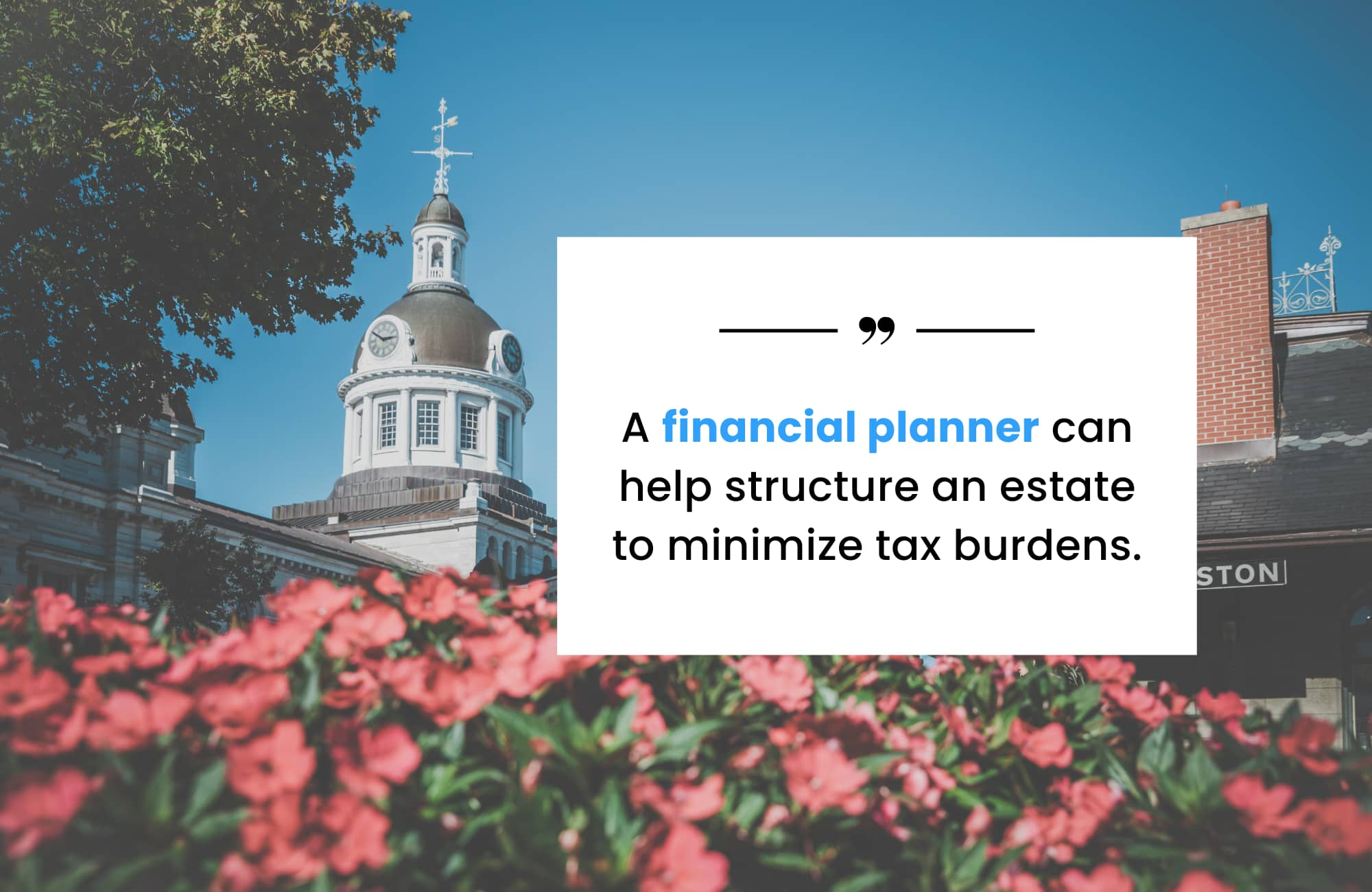
Is the use of multiple wills beneficial?
Using multiple wills can be beneficial if you’re a business owner or have private company shares.
In some provinces, like Ontario, you can have one will for assets that require probate and a second will for assets that don’t—like your shares in a private corporation. That second will prevents the probate process entirely. If done right, this can reduce the estate administration tax significantly.
It’s a simple legal method of protecting more of your estate. Talk to an estate planner or lawyer who understands how to structure multiple wills in your province.
Can I use charitable giving as a tax strategy?
Yes—giving to charity can lower your final tax bill while supporting causes you care about.
When you donate to a registered charity, your estate can claim a donation tax credit. This credit can be applied to reduce taxes owed on capital gains, RRSPs, or other income triggered by death.
For example, donating publicly traded stocks avoids capital gains tax on the appreciated value. Many Canadians set up planned gifts through their wills, or use donor-advised funds for flexibility. Charitable giving isn’t just generous—it’s smart. It helps your legacy live on, while easing the tax burden on your estate.
How should I deal with digital assets of value?
Make a plan for your digital assets—don’t let them get lost or locked away.
Digital assets include online accounts, cryptocurrencies, loyalty points, websites, and even digital art. These assets can hold real value—but if no one knows they exist, or how to access them, they could disappear forever.
Start by making a list of your digital assets and how to access them. Store this list securely, and make sure your executor knows where to find it. Some provinces now allow you to legally name a digital executor. Without a clear plan, valuable digital assets can be forgotten or tied up for years.
What is the role of the executor in estate planning?
Your executor is the person who carries out your final wishes and settles your estate.
This job comes with serious responsibility. The executor gathers your assets, pays your debts and taxes, files your final tax return, and distributes what’s left to your heirs. In high-value estates, this can mean managing investments, selling real estate, or dealing with cross-border tax issues.
Choosing the right executor is key.
It should be someone you trust, who’s organized, and who can work with professionals when needed. You can also name a corporate executor or co-executors to share the load. The right choice ensures your estate is handled properly, and your family isn’t left with a mess.
Will my children have to pay taxes on an inherited house in Canada?
If the house was the deceased’s principal residence, no capital gains tax applies when inherited.
However, if the home was a rental property, cottage, or investment property, the estate must pay tax on the increase in value up to the date of death. If your children sell the property later, they will owe capital gains tax on any further appreciation. Using a trust or gifting the property before death can help reduce these taxes.
Is selling a house to your kids for $1 a good idea?
Selling a house to your children for far below market value can trigger unwanted tax consequences.
The CRA will still assess capital gains tax as if the home was sold at fair market value, meaning the parent may face a hefty tax bill. Instead, gifting a home, setting up a trust, or using a structured sale with gradual transfers can be more tax-efficient strategies.
Consider doing the following instead:
- Gifting the property
- Setting up a trust
- Using a structured sale with gradual transfers
What is the best trust to avoid estate taxes?
A living trust (inter vivos trust) is one of the best ways to avoid estate taxes.
Assets placed in a trust are not part of the deceased’s estate, allowing them to bypass probate and reduce tax exposure. For individuals over 65, alter ego trusts and joint partner trusts offer additional tax deferral benefits, allowing for a smooth transition of wealth while maintaining control over assets during one’s lifetime.
Are a spouse and common law partner treated the same?
Yes—both a legal spouse and a common law partner are eligible for the same tax deferrals and estate rollover rules.
That means things like:
- RRSP and RRIF rollovers at death (to defer tax).
- Capital property transfers without triggering capital gains.
- Claiming the spousal amount on income tax returns.
- Survivor benefits from pensions and CPP.
But to be recognized as a common law partner, you must meet CRA’s definition:
- You’ve lived together in a conjugal relationship for at least 12 continuous months,
OR - You share a child by birth or adoption,
OR - You support each other financially and have joint responsibilities (like shared bills or housing).
Common Questions:
How to avoid probate taxes in Canada?
You can avoid probate taxes by keeping assets out of your estate.
Use tools like joint ownership with right of survivorship, named beneficiaries on accounts, investment accounts from an insurance company, multiple wills (in Ontario), or living trusts. These strategies let assets pass directly to heirs without going through the probate process.
Do beneficiaries pay tax on inheritance in Canada?
No, beneficiaries do not pay inheritance tax in Canada.
However, the estate may owe taxes before assets are distributed. This includes income tax, capital gains tax, and possibly probate fees. Once the estate settles those, the remaining assets can pass to beneficiaries tax-free.
What is a testamentary trust? Can it help to reduce estate taxes in Canada?
A testamentary trust is created in your will and takes effect after death.
It can help with income splitting, protect minors or dependents, and manage complex estates. While it doesn’t avoid probate, it can reduce tax over time by spreading income among beneficiaries in certain cases.
What is the best trust to avoid estate tax?
An inter vivos trust—like an alter ego or joint partner trust—is best to avoid probate and reduce taxes.
These trusts let you control assets during life while excluding them from your estate at death, which can lower probate fees and defer tax liabilities.
Does a spouse or common-law partner pay tax on an inheritance?
When a person dies, RRSPs, RRIFs, and other registered plans can be transferred tax-free to their spouse or common-law partner.
Avoid Ontario’s Hefty “Death Tax”
While Ontario doesn’t have a direct estate tax on your total net worth, income tax on capital gains and deemed dispositions can have a significant impact on your estate. These taxes can dramatically reduce the wealth you pass on to your loved ones.
For instance, assets like real estate (excluding your principal residence) and non-registered investments are deemed sold at fair market value upon death. The resulting capital gains are usually taxed at Ontario’s highest marginal tax rate, which exceeds 53.53% (2024).
Here’s an example: If you have an RRSP or RRIF worth $1,000,000, the government could take $535,000 in taxes upon your death. That’s more than half of your hard-earned savings—gone to taxes, not your family. And that’s before factoring in additional costs like probate fees, executor fees, legal fees, and accounting fees. What will be left for your family?
Did you know that some of your assets may even face double taxation? Without proper planning, the total financial burden on your estate could be staggering.
Key Takeaways: How to Avoid Estate Tax in Canada
- Selling a house to your kids for $1 sounds good but can trigger full capital gains tax—consider gifting, trusts, or gradual transfers instead.
- Transfer RRSPs or RRIFs to a surviving spouse or dependent child to defer tax liability on registered accounts.
- Canada doesn’t have a direct estate or inheritance tax, but capital gains tax, income tax on registered accounts, and provincial estate administration tax can take a big chunk from your estate.
- Your deceased’s final tax return includes salary, pensions, RRSPs, and deemed dispositions—all of which can create significant taxable income.
- Trigger capital gains tax can occur on non-registered assets like real estate, mutual funds, and stocks at the time of death.
- Use the principal residence exemption to avoid capital gains on your home when passing it to heirs.
- The Lifetime Capital Gains Exemption can help shelter capital gains on qualified small business shares or farm/fishing property from tax.
- Life insurance proceeds are paid tax-free to beneficiaries and can help cover estate taxes without affecting asset values.
- Establish an inter vivos trust (living trust) or an alter ego/joint partner trust to reduce taxable income and bypass estate administration tax liability.
- Create multiple wills to reduce probate tax—especially effective in Ontario for private company shares and business owners.
- Charitable donations through your will can reduce the taxes payable on your final return and create lasting tax savings.
- Deal with digital assets (like crypto or online accounts) ahead of time to prevent them from being lost or inaccessible to your executor.
- Your executor will manage your estate, file final returns, pay taxes, and distribute assets—choose wisely.
Simple Steps Can Save You Millions
With our Living Estate Plan, you can not only minimize taxes but also protect and even grow your wealth. Our proven strategies help shield your assets, ensuring more of your legacy goes to your loved ones—not the government.
Discover How to Minimize Taxes and Secure Your Legacy
Did you know that without a solid estate plan, taxes and fees in Ontario could claim a significant portion of your wealth?
If you’ve worked hard to build your business, investments, and properties, protecting your legacy for your loved ones is critical. At Strategic Wealth Protection Partners, we specialize in helping high-net-worth individuals in Ontario secure their financial futures.
Our Living Estate Plan is designed to:
- Reduce estate taxes and probate fees.
- Simplify wealth transfer to your loved ones.
- Reflect your values and priorities in every detail.
Your Legacy Matters
With our personalized guidance, we’ll help you navigate options like Living Trusts to protect your assets and ensure your family’s peace of mind. Contact us today to book your Living Estate Plan Consultation and take the first step toward a secure future.
Schedule a Living Estate Plan Consultation
Planning your legacy is about more than numbers—it’s about ensuring your family remembers you and your values are honoured for many years to come.
Estate planning and trusts can feel overwhelming, especially if it’s your first time. That’s why we’re here.
With our simple, 5-Step Living Estate Plan, we make the process easy, helping you create a comprehensive estate plan or trust that protects your assets from taxes and probate fees while preserving your legacy. Tools like The Final Word Journal capture your story, wishes, and essential details like accounts and end-of-life plans, ensuring your family has clarity and comfort.
Take the first step today—schedule a consultation call and give your family the ultimate gift: peace of mind and the assurance they were always your priority.
Read More
If you’re starting your estate planning process, you may find these articles helpful:
- How Much Can You Inherit Without Paying Taxes In Canada?
- What Is the Best Trust to Avoid Probate in Canada?
- Do Trusts Pay Taxes in Canada?
- How to Avoid Estate Tax in Ontario
- How to Avoid Inheritance Tax in Canada
About the Author
RON COOKE, PRESIDENT & FOUNDER OF STRATEGIC WEALTH PROTECTION PARTNERS

With over 30 years in financial services, I’ve seen the challenges families face when a loved one passes—lost assets, unnecessary taxes, and emotional stress. That’s why I created the Living Estate Plan, a comprehensive process to protect assets, eliminate estate and probate fees, and create legacies that are remembered for many years to come.
This plan ensures your family receives not just your wealth, but a meaningful reminder of your care and love. Tools like The Final Word Journal capture your story, wishes, and essential details, offering clarity and comfort during difficult times.
Your final gift should be more than money—it should be peace of mind, cherished memories, and an organized estate.
Schedule a Call
Schedule a 30-minute consultation call with Strategic Wealth Protection Partners.
Click HERE to schedule a consultation.


